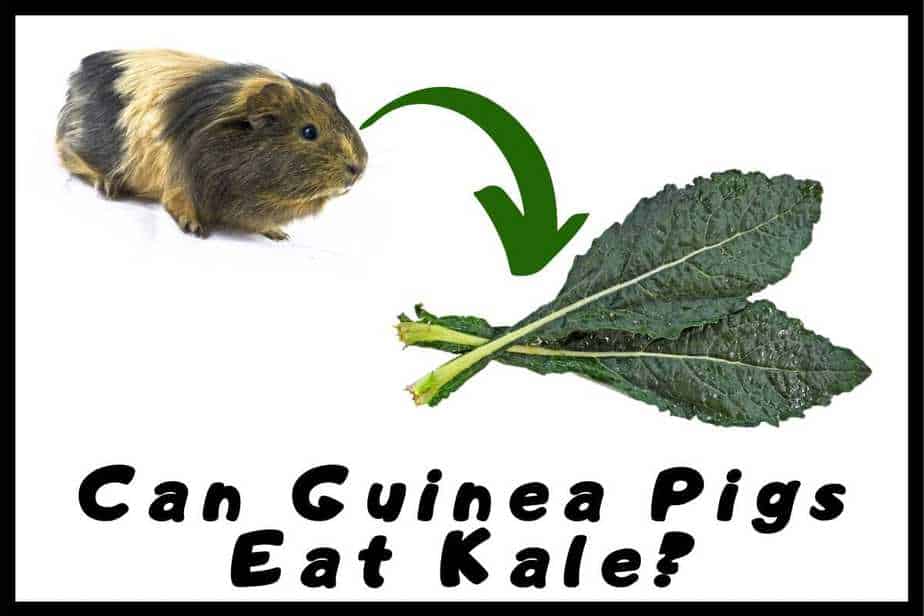Packed with a lot of Vitamins, Minerals, and Anti-oxidants, there is no other vegetable as healthy as Kale. Kale is a superfood for human beings, which is packed with beneficial compounds and medicinal properties. But how good is Kale for our guinea pigs?
Can guinea pigs eat kale? Yes, guinea pigs can eat kale for sure. Kale is packed with Vitamin C, Vitamin A, and Anti-oxidants, which is a must for guinea pigs. On the other hand, kale also has high calcium and potassium in it, which can lead to bladder stones & excessive thirst in guinea pigs. Thus, moderate serving is advised.
Guinea pigs need a cup of fresh vegetables daily. Only hay & pellets cannot provide them with the essential Vitamins needed by our guinea pigs. Thus, vegetables should be a part of their daily diet.
Provide A cup of fresh veggies consisting of 5-6 different types of veggies in it. You can include one or two leafy vegetables like Lettuce, cabbage, spinach, etc., one or two staple vegetables like Bell peppers, Cilantro, etc. and one or two other veggies to make a complete balanced diet.
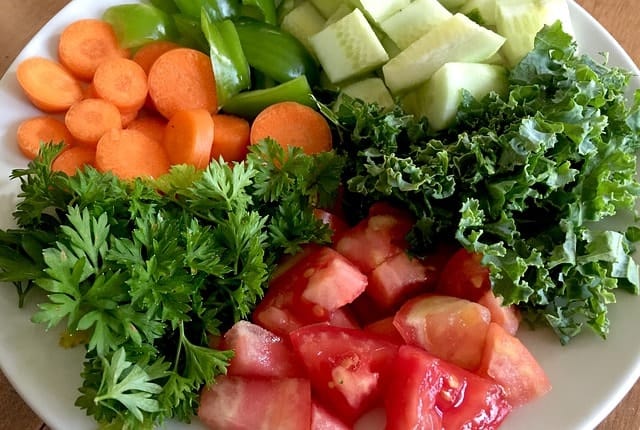
We have an in-depth article covering 70+ Vegetable list(serving size, Hazard) for your guinea pigs. Feel free to check it out!
Coming back to our topic, how nutritious is kale for our guinea pigs? Can feeding kale be bad also? How much kale should you feed?
I know there is a lot more question in your mind which you want to get an answer for. Don’t worry; I have covered everything your mind can wander and answered all the queries in this article. Just follow along with me till the end, and I shall ensure you have no questions left behind.
Nutrition In Kale?
Source: USDA National Nutrient database
| Nutrients | Amount |
|---|---|
| Vitamin C | 93.4 mg/ 100 g |
| Vitamin A | 4812 IU |
| Vitamin K | 389 mcg/ 100 g |
| Calcium | 254 mg/ 100 g |
| Phosphorous | 55 mg/ 100 g |
| Potassium | 348 mg/ 100 g |
| Fiber | 4.1 g/ 100 g |
| Sugar | 0.99 g/ 100 g |
| Protein | 2.92 g/ 100 g |
| Carbs | 4.42 g/ 100 g |
| Calories | 35 Kcal |
| Fat | 1.49 g/ 100 g |
| Water | 89.63 g/ 100 g |
Kale is an excellent source of Vitamin A, Vitamin K & Vitamin C. These Vitamins and essential for the body as they play a vital role in keeping the body healthy and fit.
Vitamin A is needed for the proper functioning of the liver, kidney, and other essential organs.
Vitamin C is vital for maintaining strong immunity and preventing a lot of diseases.
Vitamin K also plays a crucial role as it prevents excessive bleeding by helping in blood clots. It also prevents inflammation and improves the digestion of the body.
Kale is also rich in Calcium, Potassium, Iron, and magnesium. These vitamins are also essential for maintaining cholesterol levels, lowering blood pressure, the formation of bones and tissues, and many other functions of the body.
Okay Okay, I got that kale is packed with lots of vitamins and minerals. But can kale harm my guinea pig’s health as well?
Is Kale bad for guinea pigs?
No, Kale is entirely safe for your guinea pigs if we serve it in moderation. In fact, leafy vegetables like Kale and lettuce should be added to your guinea pig’s diet, but the serving should be monitored to avoid the adverse effects.
Anything in excess is bad
The thought goes well with the diet of our guinea pigs as well. Kale can be beneficial for our guinea pig’s health if served in limited quantity.
However, if served in excess, it can have some adverse effects on their health. Some of the most commonly noticed problems are:
Stone Formation: Kale is rich in calcium and serving it regularly or in large quantities can lead to the formation of stones in guinea pigs. High calcium food should be served sparsely and with the mix of other low calcium food to avoid health issues.
Bone pain & Rough Skin: Kale is also rich in Vitamin A, although Vitamin A is needed by guinea pigs; the excess of the same can lead to pain in the bones and rough skin in guinea pigs. If you serve too much kale to your guinea pigs it can lead to Vitamin A toxicity inducing these symptoms in your guinea pigs.
Diarrhea and other digestive issues: Guinea pigs have a sensitive digestive system and frequent changes in diet or excessive feeding can lead to severe diarrhea and other digestive issues in guinea pigs. Always make sure you feed any food(except hay) in moderation to your guinea pigs.
Abnormal Muscle Contraction: When guinea pigs are served high potassium food(like kale) for a long time(or in large quantities) then they might suffer from abnormal muscle contraction. It can further lead to abnormal movement and other health issues in guinea pigs.
If they like it and it didn’t have any adverse effect on their digestive system, then you can add a little more.
However, if you see any signs of diarrhea, then pull back and try again after a few days. In most scenarios, Kale should not have any harmful effects if you maintain the right serving size.
Health benefits of kale for cavies health?
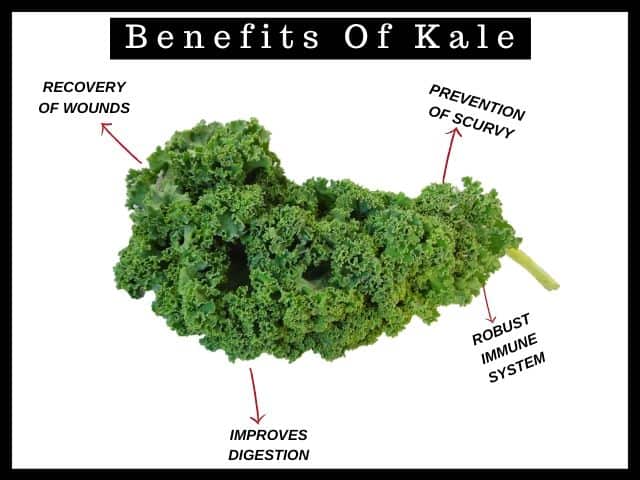
Kale is a superfood for guinea pigs as well. If served in moderation, you can avoid all the problems it can cause in guinea pigs and take advantage of its nutrients. Here are some of the benefits of serving kale to your guinea pigs:
Robust immune system: Kale is rich in Vitamins, Minerals, and Anti-oxidants like beta-carotene, flavonoids, and polyphenols that help in developing a robust immunity system in guinea pigs.
Prevention of scurvy: Kale contains a colossal amount of Vitamin C in it. Vitamin C is essential for our guinea pigs as guinea pigs can’t produce their own Vitamin C. Thus, adding kale in your guinea pig’s diet can help introduce some additional Vitamin C in their diet. Vitamin C is also essential because many guinea pigs suffer from Scurvy due to lack of it.
Recovery of wounds: Kale is also rich in Vitamin K that helps in controlling excessive bleeding and quick recovery of wounds. Always make sure you have adequate Vitamin K added in your guinea pig’s diet.
Improves Digestion: Kale is rich in dietary fibers, which helps in improving the digestion of your guinea pigs. Fiber is an essential part of the guinea pig’s diet as it helps in proper bowel movement and making their digestive system strong and healthy.
How much kale should I feed my guinea pig?
We should only feed one or two small leaves of Kale to our guinea pigs. Always make sure you mix it with other low calcium veggies for proper balance.
Also, remember that the serving size is dependent upon the age, diet, various other factors.
Please note: Guinea pigs who are suffering from bladder stones or have a record of calcium traces in their urine should not be fed cabbage. Although sparse feeding will not harm much, it is a wise decision to avoid high calcium vegetables altogether.
How often can guinea pigs eat kale?
Kale can be served 2-3 times a week to your guinea pigs. Yes, it is packed with lots of Vitamins and minerals needed by our guinea pigs, but regular serving can be bad for our guinea pig’s health. Thus, make sure you serve Kale on alternative days only.
Vegetables such as Lettuce, zucchini, Bell peppers, should be part of their daily diet.
Can guinea pigs eat kale greens?
Yes, guinea pigs can eat kale-green with no problem at all. In fact, Kale green is the part that has the most Vitamins and Minerals in them. Thus, serving it with other veggies is suitable for your guinea pgs health.
Can guinea pigs eat kale stems?
Yes, guinea pigs can eat kale stems or stalks with no problem at all. The stalk of kale contains a good amount of fiber in it, which is suitable for the digestive system of our guinea pigs.
The rough and hard texture of the stems also helps in wearing down the teeth of your guinea pig, which is crucial as well.
Some guinea pig owners debate that the stem of kale can cause digestive issues in guinea pigs.
However, there is no concrete proof of the same. I shall leave it upon your judgment whether or not you want to add it to your guinea pig’s diet.
Can guinea pigs eat frozen kale?
Yes, guinea pigs can eat frozen kale, but you need to thaw it before serving it to your guinea pigs. You should never throw frozen food directly into your guinea pig’s food bowl.
Frozen food can lead to diarrhea in guinea pigs if not prepared properly. Thus, make sure you wash the kale properly and thaw it well before serving it to your guinea pigs.
Can guinea pigs eat cooked kale?
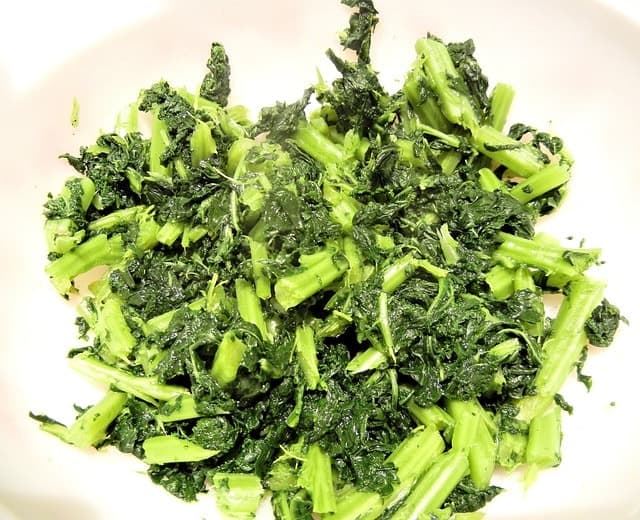
No, Guinea pigs cannot eat cooked kale at all. Cooked food can lead to digestion issues in guinea pigs.
It is best if you serve only Fresh, Raw Kale to your guinea pigs.
Also, cooking kale often leads to loss of Vitamin C in it, which is terrible for your guinea pigs.
How to prepare kale for your guinea pigs?
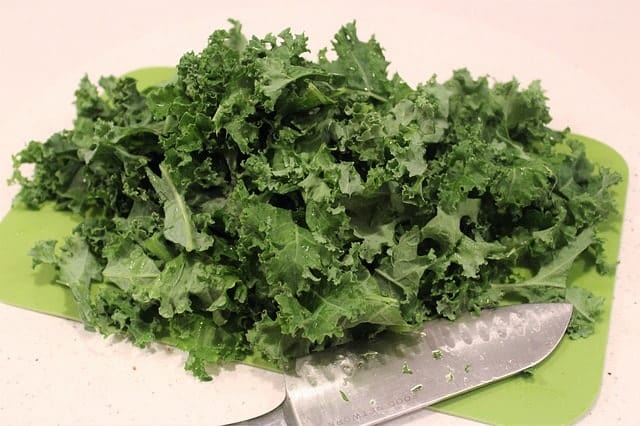
Preparing Kale for your guinea pig is relatively simple. You can follow the following steps to make Kale for your guinea pigs in the right way:
- The first step is to choose the kale for your guinea pigs. The kale you get should be fresh and free from pesticides and chemicals. Avoid wilting kale entirely.
- The second step is to wash the kale properly. It might contain some chemical traces that can be bad for your guinea pigs. Thus, washing kale properly is crucial.
- The third step is to cut the kale into small slices and mix it with other vegetables and serve it to your guinea pigs.
- The final step is to remove any uneaten food from the cage. Uneaten food can attract rats and flies, which is a threat to your guinea pigs.
Conclusion: Guinea pigs and Kale
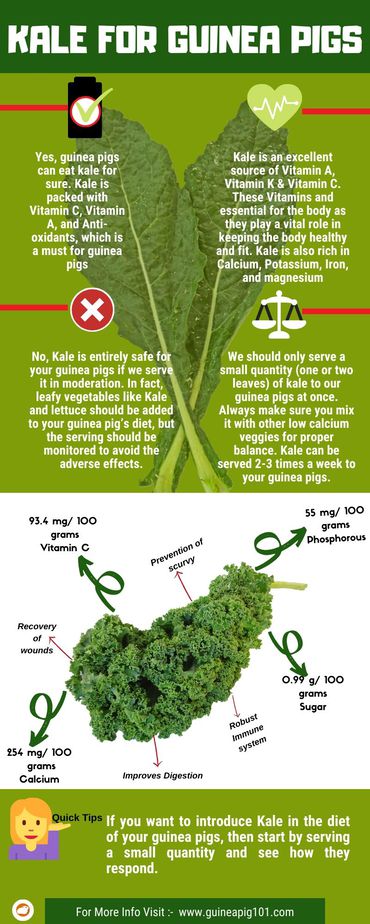
- Kale is an excellent source of Vitamin A, Vitamin C, Vitamin K, and a lot of other essential nutrients.
- Should you give Kale to your guinea pigs? Yes, you should definitely give Kale to your guinea pigs.
- Make sure you serve only one or two small leaves of Kale to your guinea pigs in a day.
- Never feed Kale more than 3-4 times a week to your guinea pigs. Ideally, you should add it 2-3 times a week only.
- Overfeeding of Kale can lead to Diarrhea, Stone formation, and other diseases in guinea pigs
- Also, remember the staple part of the guinea pig’s diet is hay. Vegetables are only a supplement for various vitamins and minerals in a guinea pig’s diet. Under no circumstances, the vegetables can be served as a significant portion of their diet.
FAQ
Can guinea pigs eat red Russian kale?
Yes, guinea pigs can eat red Russian kale. Make sure you limit the serving size as you do with the regular one.
Can guinea pigs eat black kale?
Yes, guinea pigs can eat black kale.
Can guinea pigs eat white kale?
Yes, guinea pigs can eat white kale.
Can guinea pigs eat purple kale?
Yes, guinea pigs can eat purple kale.
Can guinea pigs eat red kale?
Yes, guinea pigs can eat Red kale.
Can guinea pigs eat curly kale?
Yes, guinea pigs can eat Curly kale. Curly kale is more popular in the UK rather than in the US.
Can guinea pigs eat Chinese kale?
Yes, guinea pigs can eat Chinese kale.
Can guinea pigs eat Tuscan kale?
Yes, guinea pigs can eat Tuscan kale.
Can guinea pigs eat cavolo nero kale?
Yes, guinea pigs can eat cavolo nero kale.
Can guinea pigs eat baby kale?
Yes, guinea pigs can eat baby kale.
Can guinea pigs eat buttonhole kale?
Yes, guinea pigs can eat buttonhole kale.
Can guinea pigs eat Lacinato kale?
Yes, guinea pigs can eat lacinato kale.
Can guinea pigs eat kale every day?
No, guinea pigs cannot eat kale every day. Kale contains a high proportion of calcium and Vitamin A, which can be bad for their health if fed regularly. Also, make sure you feed a small amount at a time to avoid health issues.
Can guinea pigs eat raw kale?
Yes, guinea pigs can eat raw kale. In fact, raw kale has a lot of Vitamins and minerals, which are beneficial for our guinea pigs. Also, cooked vegetables are bad for our guinea pig’s health.
Source: Vitamin A Requirement of the Guinea Pig, high-potassium induced contracture in guinea pig ureter, The effects of diet on anatomy, physiology, and health in the guinea pig, Is Your Guinea Pig’s Diet Providing the Right Nutrients? Care of Guinea Pigs
